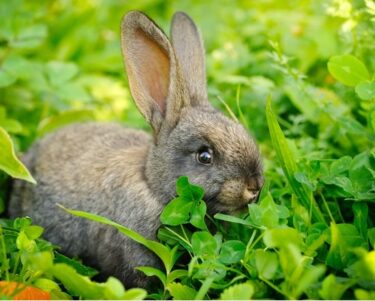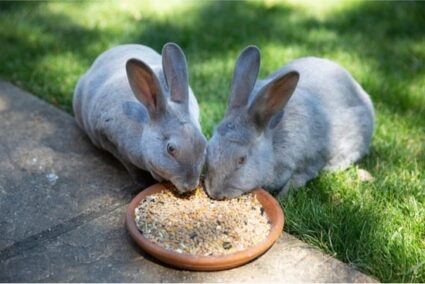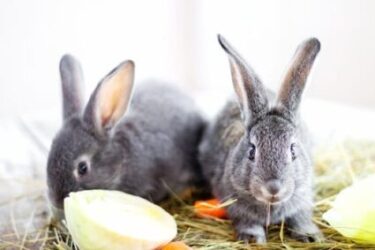Pet rabbits eat up to 30 times per day, so they need a steady supply of food. Rabbits do not have the same dietary requirements as most other domesticated animals, so we need to be aware of what they can and can’t eat. Above all, we need to know which foods are poisonous to rabbits.
Rabbits should never be fed avocado, fruit pips, or rhubarb. Even small amounts of these foods can be fatal. Other foods such as muesli, dog or cat food, and nuts are not toxic to rabbits, but they can lead to illnesses and digestive problems, such as diarrhea, if consumed regularly.
Rabbits who are fed an appropriate diet are less likely to graze on unhealthy or toxic foods. That’s why it’s so important to feed your rabbit a species-appropriate diet and to moderate food types that lead to obesity.
What Foods Are Rabbits Not Allowed to Eat?
There are foods that rabbits should not eat, but only some of these will result in a fatality. Toxic foods are those that are most likely to result in the immediate death of a pet rabbit.
In contrast, ‘unhealthy’ foods will not cause a rabbit to die. Even so, they can lead to diarrhea, weight loss/gain, and other health issues.
Avocados
Avocado is one of the most dangerous foods for rabbits. This is because it contains a toxic compound called Persin. If a rabbit ingests too much Persin, it will quickly develop breathing problems. This can lead to heart failure and eventual death in some cases.
If a rabbit has just 1-2 bites of avocado, it may not have a severe reaction. However, you should still contact your vet for advice.
Fruit Pips and Seeds
Although small amounts of apple flesh are OK, apple seeds are a no-no. Apple seeds contain a compound that is toxic to rabbits. So, if you serve up some apple as a treat, make sure that all of the pips have been removed.
It’s not just apple pips that are harmful, but apricot, peach, and plum pits, too. These contain trace amounts of cyanide. Rabbits should not be fed any fruit pips, seeds, or pits in case they experience an adverse reaction.
Rhubarb
Rhubarb is an irritant that can cause severe reactions in rabbits. Also, it contains a high concentration of oxalates. These can interfere with calcium absorption. So, if you grow rhubarb in your yard, make sure your rabbit does not have access to any. Symptoms of rhubarb poisoning include:
- A swollen or sore mouth
- Diarrhea
- Bloated or sore tummy
- Drinking lots of water
- Lethargy
Although the symptoms can be severe, death due to rhubarb poisoning is quite rare when rabbits are taken to the vet promptly for treatment.
Chocolate
Chocolate contains two types of methylxanthines that are very harmful. These are as follows:
- Theobromine
- Caffeine
The higher the cocoa content, the higher the concentration of methylxanthines. So, if your rabbit were to eat a few squares of dark chocolate, this would be a medical emergency. Even white chocolate can cause a severe reaction in some rabbits. According to PDSA, symptoms of chocolate poisoning include:
- Diarrhea. Vomiting would usually apply, but rabbits cannot vomit
- Restlessness
- Squirming when you try and touch its stomach
- Trembling and panting
- A high temperature
Although most of us would not treat our rabbits with chocolate, most of us do leave packets of half-opened chocolate lying about the house. This is risky when there are pets inside the home. So, always make sure that you get into the habit of shutting chocolate away.
Allium Vegetables
Allium-type vegetables can cause serious illness. These veg include:
- Onions (red and brown)
- Garlic
- Shallots
- Chives
The problem with these vegetables is that they can cause hemolytic anemia (loss of red blood cells). This can cause dizziness, weakness, and eventual death if not treated. If that were not enough, allium-type vegetables can also cause anaphylactic shock in some rabbits.
Iceberg Lettuce
We quite literally refer to lettuce as “rabbit food,” so surely it can’t be toxic for rabbits? Well, dark forms of lettuce (i.e. Romaine) are suitable for rabbits. However, iceberg lettuce is unhealthy because it contains a harmful chemical called lactucarium.
Lactucarium is not usually harmful in small amounts, but a large portion of iceberg lettuce could cause diarrhea and physical weakness. Very young rabbits could even die from overeating iceberg lettuce.
Potato Leaves
Potatoes are not a good food source for rabbits because they are high in starch. This makes potatoes difficult to digest, but not poisonous.
A small amount of potato may not do any harm to a rabbit. However, potato tops and leaves could be poisonous to a rabbit.
Sugary Processed Foods
When you’re enjoying a cookie or a piece of cake, you may be tempted to give your rabbit a bite, but you shouldn’t. According to MSD, sugary, high-carb foods can trigger Enterotoxemia in rabbits. This is a severe case of diarrhea that is often fatal.
Enterotoxemia occurs when there is an overgrowth of Clostridium-type bacteria in the rabbit’s cecum (the pouch between the small and large intestine). These bacteria release a toxin that is fatal. It’s thought that sugary, high-carb foods encourage the bacteria to multiply.
While a single serving of sugary foods is unlikely to trigger Enterotoxemia, it could happen in very young or weak rabbits. Also, rabbits that don’t eat enough fiber are particularly susceptible.

What to Do If your Rabbit Eats Something Toxic
If your rabbit has eaten one of the above foods, you should speak to your vet. Many of these foods can cause death in a matter of hours. Foods like iceberg lettuce and cookies are less likely to be fatal to healthy, adult rabbits. Your vet can advise if any treatment is required.
At times, rabbits eat something toxic without us realizing it. We may only come to realize when our rabbit falls sick. Concerning symptoms include:
- Diarrhea
- Glazed over eyes
- Weakness
- Drinking much more than usual
- Restlessness
Foods Rabbits Should Avoid Eating
Some foods are not ‘toxic’ to rabbits but should nonetheless be avoided. These foods are unhealthy and can cause disease over time. To be specific, these foods are difficult to digest and are usually very high in calories. This means they can cause stomach pain and obesity.
Muesli
Remember that we said sugary, high-carb foods are bad for rabbits? Well, muesli falls into this category. Muesli-based rabbit feed was once a popular pet food, but we now know that it’s unhealthy. This is because a high-carb/high-sugar diet can lead to the following problems:
- Dental disease. According to BMJ, dental disease is “extremely common” in rabbits fed a muesli-based diet.
- Diarrhea and gastrointestinal problems
- Weight gain
- Enteroteoxema, in the most severe cases
In theory, muesli should be healthy because it contains high-fiber pellets. However, most rabbits pick out the pieces of cereal because they are tastier than the pellets, so the rabbit consumes too much carbohydrate.
Nuts
Most rabbits love the taste of nuts, but they are not a good food choice. They should only be fed to a rabbit in moderation.
Nuts are very high in fat, which is a problem because rabbits need a relatively low-fat diet to thrive. The high-fat content may cause digestive issues and bowel problems. Also, nuts are a choking hazard.
Cat or Dog Food
In multi-pet households, it’s quite common for animals to share (or steal) each other’s food. And in some cases, rabbits do develop a taste for dog/cat food. But is it safe for rabbits to eat dog and cat food?
While this food is not toxic, you should not encourage this behavior. These foods are high in calories so eating them will probably cause weight gain.
Most dog/cat foods contain animal protein. Rabbits are herbivores so they lack the necessary enzymes to digest meat. Added to this, these foods contain amino acids, vitamins, and minerals that may be unnecessary.
Rabbits should be fed a low-calcium diet because high levels of calcium can lead to kidney stones and urinary tract infections. Cat and dog foods contain added calcium, so this is not recommended for rabbits.
Cauliflower
Given that rabbits are herbivorous, you might assume that it’s OK to give them any vegetables. Unfortunately, this is not the case. Rabbits can eat different vegetables, but cauliflower is not one of them. Whether it is raw or cooked, cauliflower can cause severe bloating in rabbits.
Parsnips
Although parsnips are acceptable in small amounts, they are not a recommended food for rabbits. Parsnips contain a lot of starch so they may be difficult to digest. Added to which, they are relatively high in calories, so eating them regularly will result in weight gain.
Raisins
Raisins are very high in sugar so they will be difficult to digest (and may even cause Enterotoxemia). Also, according to TandF, raisins can obstruct the exit of the stomach if they become lodged there.
Rabbits quickly develop a taste for raisins, so you might feel like your denying your rabbit its favorite treat. However, there are plenty of healthier ways to treat your rabbit.
What Can Rabbits Eat?
So far, we’ve looked at what rabbits cannot eat. So, this begs the question, what can rabbits eat? Well, this is the optimum diet for an adult rabbit:
- Unlimited Grass Hay – Grass hay is a requirement for all rabbits whether you feed them pellets or not.
- Leafy Green Vegetables – 1 cup of greens per pound of body weight per day
- Unlimited Water – Most rabbits prefer to drink from a bowl
The following are optional and can help to enhance a rabbit’s diet if given in the correct portions:
- High-Fiber Rabbit Pellets – Typically 25g – 50g per day
- Other Vegetables (celery, broccoli, bell peppers, etc.) No more than 1 tablespoon per pound of body weight per day
- Fruit – Occasionally, in tiny amounts
- Access to growing grass for grazing
Rabbits have unique dietary requirements. If you don’t meet these requirements, your rabbit may become very sick. Also, a hungry rabbit is more likely to graze on unhealthy or toxic foods.

Importance of Fiber for Rabbits
As we know, rabbits are herbivores, so their gastrointestinal (GI) tracts can handle a very high-fiber, low nutrient diet. In contrast, their GI tract cannot handle large amounts of fat, protein, or starch.
So, what’s the best source of fiber for rabbits? Well, rabbits should get most of their fiber from hay. According to MAG, hay should comprise 80% of a rabbit’s diet. Timothy hay is ideal due to its low calcium and protein content. Each day, provide a bundle of hay that’s at least as big as them.
Hay is a great choice for rabbits because the act of chewing shortens their teeth. It may also help to prevent Enterotoxemia by cleaning the GI tract.
In addition to hay, rabbits should be given moderate amounts of leafy green vegetables and small portions of other vegetables. These provide additional fiber as well as water, vitamins, and minerals.
What Vegetables Can I Feed My Rabbit?
Given the sheer variety of vegetables, it’s hard to remember which are safe for rabbits and which are not. In terms of leafy greens, the following vegetables are safe for rabbits:
- Curly kale
- Spring greens
- Rocket
- Small amounts of Romaine lettuce
- Dark green cabbage
- Beetroot greens
- Radish greens
You should feed your rabbit 1 cup of greens per pound of body weight (per day). The average rabbit is around 5 pounds so that’s 5 cups of greens. You can split these into small portions because rabbits feed up to 30 times a day. Also, rabbits can be fed small amounts of the following vegetables:
- Broccoli
- Celery
- Bell pepper
- Jerusalem artichoke
- Celeriac
The portion size is 1 tablespoon per pound of body weight per day. Rabbits can also be fed small amounts of herbs such as Basil, Dill, and Mint.
Rabbit Pellet Portion Size
Most owners will supplement their rabbit’s diet with pellets. Pellets can be beneficial because they provide protein, nutrients, and additional fiber. However, it’s important not to overfeed your rabbit.
The bulk of a rabbit’s diet comes from hay, so they don’t need a huge serving of pellets (typically 1 egg cup per day). The only exception is if your rabbit is underweight. In this case, alfalfa hay and/or a large serving of pellets can be used to bulk them up. When shopping for pellets, choose a high-quality, high-fiber variety.
Healthy Treats for Rabbits
Many foods that we think are OK for rabbits are harmful. So, what is a good treat for rabbits? Here are some options:
- Brussel sprouts (make sure the stalk is not attached)
- Small pieces of apple (remove any pips)
- Small amounts of carrot/carrot tops
- Small pieces of sweet potato
Fruit should not be given every day as it can damage the rabbit’s teeth.
What If My Rabbit Won’t Eat Hay?
Sometimes, rabbits don’t take an interest in hay. This is problematic because, if they don’t curb their appetite with hay, they’re more likely to overeat pellets. Or, they’ll steal poisonous foods, such as chocolate or cookies. If your rabbit seems to dislike hay, try the following:
- Choose a high-quality variety that’s free from dust.
- Your rabbit may prefer a different variety so try hay cubes, kiln-dried grass, and hay cookies.
- Pull apart the hay a little and sprinkle some herbs inside.
- Stuff some of their hay inside a cardboard tube, so they need to work harder to get at it. This can make the hay more interesting.
- Reduce the number of pellets but do so gradually.
If your rabbit cannot be persuaded to eat hay, this could be due to dental disease or another health problem. Consult your vet for advice.
Changing a Rabbit’s Diet
If you’d like to improve your rabbit’s diet, it’s important to make dietary changes gradually. This will give your rabbit’s GI tract time to adjust. Rabbits can become very sick if their diet is altered suddenly.
So, if your rabbit is eating a muesli-based feed, you should replace this with pellets. The RSPCA recommends doing this over 2-3 weeks. So, each day, slightly decrease the amount of muesli and increase the number of pellets. At the end of the third week, your rabbit should only be eating pellets.
Offer your rabbit a wider variety of vegetables. Variety is a good thing, but it’s essential to make changes gradually. Reintroduce one new vegetable at a time and closely monitor your rabbit’s bowel habits.
The bulk of your rabbit’s diet should be hay. If they are not eating enough hay, follow the tips mentioned above. If you are feeding too many pellets or vegetables, these should be reduced gradually over 2-3 weeks. If your rabbit doesn’t increase its intake of hay in response, you should speak to your vet.
Food Safety Tips for Rabbit Owners
As rabbit owners, one of our fears is feeding our rabbit something toxic. It’s also crucial that we feed our rabbit a species-appropriate diet. So, here are some food safety tips to remember:
- Although rabbits are herbivorous, some fruits and vegetables can cause fatal reactions. These include rhubarb, avocado, allium-type vegetables, and iceberg lettuce.
- The leaves of potato plants can be toxic to rabbits.
- In terms of garden plants, most plants that grow from bulbs are poisonous to rabbits.
- A rabbit’s gastrointestinal tract cannot handle large amounts of carbs or sugar. Root vegetables such as parsnips, sweet potato, etc are OK in small quantities. But rabbits should never be given processed carbs (biscuits, cakes, etc.).
- Small pieces of fruit (i.e. apples) can be given as an occasional treat, but the pips/seeds must be removed.
- Hay should form the bulk of a rabbit’s diet as this will help to promote good gastrointestinal health. It will also prevent unhealthy snacking.
- Unlimited water should be provided, and most rabbits prefer to drink from a bowl rather than a bottle.
The most important tip is to be cautious. Only feed your rabbit something if you are 100% sure that it’s safe to consume. Rabbits’ dietary requirements aren’t intuitive, so never make any assumptions.


Oh I have raised rabbits and showed them in 4h as a kid now my daughter is doing the same!! This site has been so helpful thanks!!!
Can I feed jackfruit leaves and mango leaves or paddy hay
Hay is not available in our area
my rabbits get abundant fresh organic grass and dandelion greens in season. plaintain, pigs ear weed, is a favorite later on. There is henbit also growing in the yard. is henbit safe and nutritious for my furry termites?
This list is missing a few deadly things, but a big one they forgot to mention is cabbage. It is a gas producing vegetable and can kill your rabbit.